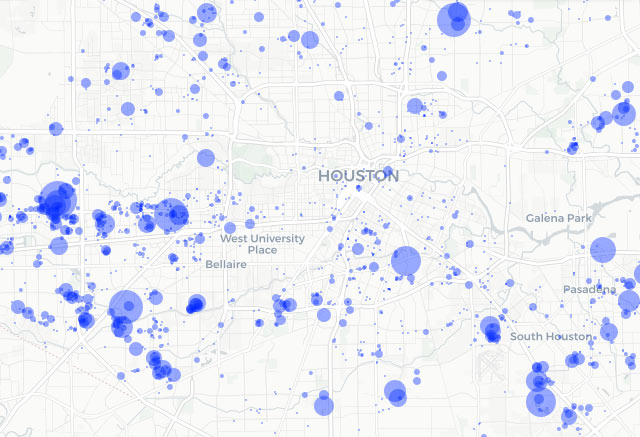WHAT LANDLORDS HAVE OUSTED THE MOST TENANTS AFTER HARVEY, AND OTHER POST-DILUVIAN EVICTION FACTS  Since Harvey, the odds of tenants beating their eviction lawsuits have doubled. But their chances are still pretty slim: landlords win 94% of the time (down 3.73% since August), notes Houston data analyst Jeff Reichman. His recent report on citywide eviction trends after the storm features a ranking of which landlords have kicked out the most tenants. (Although that accounting also includes owners of storage rental facilities.) Also in the report: a map (a preview of which is included above) showing post-storm eviction density by address, an analysis of the time it takes for evictions to get through Houston’s court system (an average of 20 days), and the months during which the most evictions have historically occurred (January, with subsequent high volume between June and August). [January Advisors] Map of evictions after Harvey: January Advisors
Since Harvey, the odds of tenants beating their eviction lawsuits have doubled. But their chances are still pretty slim: landlords win 94% of the time (down 3.73% since August), notes Houston data analyst Jeff Reichman. His recent report on citywide eviction trends after the storm features a ranking of which landlords have kicked out the most tenants. (Although that accounting also includes owners of storage rental facilities.) Also in the report: a map (a preview of which is included above) showing post-storm eviction density by address, an analysis of the time it takes for evictions to get through Houston’s court system (an average of 20 days), and the months during which the most evictions have historically occurred (January, with subsequent high volume between June and August). [January Advisors] Map of evictions after Harvey: January Advisors





When I comes down to it, they own the property and when your lease is up, they don’t have to renew it. This is the rub of pure capitalism. It can’t be cruel and brutal. They don’t care about you in the least; it’s all about how they can get the most out of their investment. Of course, you’re free to leave as well when your lease is up, so there is that.
As a business owner and employer, Thayer makes the mid term voting easy. What happened to the Democratic party my Father supported? Even Carter would be trashed now. WTF?
Both renter and property owner have the same obligation under the lease. Almost all eviction cases are for the non payment of rent, so of course the renters most often lose as there are as few reasons to not pay rent as there are to not pay a mortgage.
Property owner agrees to provide housing, renter agrees to pay for it. The price is fixed for the term of the lease. After the lease is up, the renter can ask to pay less, and the owner can ask to pay more. If they agree on a new price, a new lease is done. If they don’t agree on price (or one of the two want to end the relationship), they can part ways.
.
Renters don’t care about the property owner (nor should they I suppose). They just want to pay as little as possible. Yet it’s always framed as the inverse, even though both statements are true. And neither of them impart malice on either party.
Thank you for that, Cody, you beat me to it. Thayer do you really think tenants are putting a Landlords well being ahead of their own. Of course not, and yet you seem to think it’s the job of a Landlord to look out for the future of tenants? And people who invest in rental properties, do it (gasp) to make money. And it’s not always easy. Most tenants are never going to treat a Landlord’s property as well as they would their own. And then you turn around and state that when the lease is up that tenants are free to leave. Why do you think this shouldn’t apply to both parties.